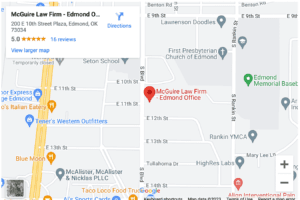What’s the Discovery Process in a Personal Injury Case?

If you are hurt in an accident, then you may be eligible to receive compensation for your injuries. It is important to understand the steps that are involved in a personal injury lawsuit before you decide to file one. One of the most important steps in a personal injury case is the discovery process.
The discovery process seeks to inform both sides of all the information and evidence in a given case. If you have specific questions about your personal injury case, then it is important to speak to an experienced personal injury lawyer who can best guide you.
What is Discovery?
Discovery is an information-gathering phase that happens during a lawsuit. The Oklahoma Rules of Civil Procedure allow both sides of a lawsuit to seek and obtain relevant information for their claims or defenses. The information gained in the discovery process is the backbone of a case. It is also the only type of evidence that will be allowed at a trial.
A court will typically not allow any surprise evidence at trial. All of the necessary evidence was supposed to have been shared during the discovery phase.
Why is the Discovery Phase So Significant?
It is unlikely that both sides know all of the necessary information for the claims when a personal injury lawsuit is first filed. Typically, the only real evidence that both sides have at the beginning of a case is that an accident occurred and that one or more people were injured as a result. In a personal injury case, the discovery phase can help both sides determine what happened, who was at fault, and the extent of the injuries that resulted.
Once the discovery phase is over, both sides in a lawsuit will typically have a clearer idea of their cases’ strengths and weaknesses, which often leads to settlements. Discovery will also sometimes show that a settlement isn’t possible and that a trial is necessary to win your case.
How Long Does the Discovery Phase Typically Last?
The discovery phase in a personal injury case typically lasts anywhere from six months to a year. If you have been injured in a medical malpractice case, then the discovery phase can last even longer than that. The severity and prognosis of injuries often dictate how long the discovery phase will last. If there are injuries that are still being assessed for their long-term effects, then a court may allow more time to gather all the necessary information before the case moves forward.
What are the Permitted Methods of Discovery?
There are two main types of discovery that take place in an Oklahoma personal injury case: written discovery and depositions. Written discovery can come in three forms: Interrogatories, requests for production of documents, and requests for admissions.
These are described further below:
- Interrogatories: These are written questions that both sides of a personal injury lawsuit will send to each other asking for information about the case.
- Requests for production of documents: These are requests for copies of important documents, such as medical bills, insurance policies, or other important records.
- Requests for admissions: These are requests that a party in a lawsuit admit to certain information relating to a case.
The Oklahoma Rules of Civil Procedure allow a limit of 30 interrogatories, 30 requests for the production of documents, and 30 requests for admissions from both sides of a case. These are the only types of written discovery that are available in Oklahoma personal injury cases.
The last type of discovery available in an Oklahoma personal injury case is the verbal discovery that is obtained in depositions. In a deposition, a witness is sworn under oath and required to answer questions relating to the case. The entire session will be recorded and transcribed by a court reporter to become part of the evidence in a case. The testimony in depositions is often crucial to a case and can help force a resolution.
If a party is not faithfully following the discovery rules in a case, then a party can file a motion to compel discovery with the court. The party will argue their motion in front of a judge to force the production of documents or testimony.
What are the Limitations on Discovery?
Discovery is not unlimited. Certain types of information are allowed to remain confidential under the law, even if there is a discovery order in place. Certain communications are privileged and cannot be shared unless the people involved decide to reveal the information on their own.
You are typically not allowed to seek evidence related to discussions between:
- An attorney and client
- Married spouses
- Doctor and patient
- Religious guide and follower
If you have questions about what discovery might be available in your case, give us a call at McGuire Law Firm for help!
Contact Us Today for a Free Consultation
If you have been injured in an accident, then it is important that you speak to an experienced personal injury lawyer who can answer your questions. We are proud to offer free consultations to all prospective clients at McGuire Law Firm. To schedule your consultation, call us at (405) 513-5658 or contact us online.

